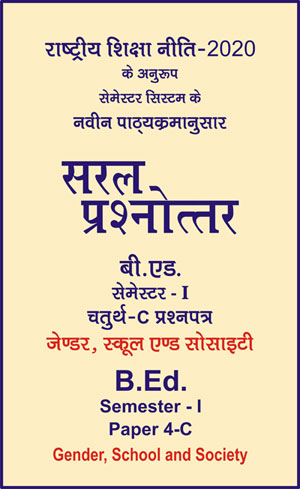|
बी एड - एम एड >> बी.एड. सेमेस्टर-1 प्रश्नपत्र-IV-C - जेण्डर, स्कूल एण्ड सोसाइटी बी.एड. सेमेस्टर-1 प्रश्नपत्र-IV-C - जेण्डर, स्कूल एण्ड सोसाइटीसरल प्रश्नोत्तर समूह
|
5 पाठक हैं |
||||||
बी.एड. सेमेस्टर-1 प्रश्नपत्र-IV-C - जेण्डर, स्कूल एण्ड सोसाइटी (अंग्रेजी भाषाा में)
Question- Discuss the conservative attitudes prevailing towards women in the economic fields.
Related Short Answer Questions
- Who got more profit due to industrialization and how?
- What has been said in the 73rd and 74th Constitutional Amendments of the Constitution?
Answer -
In the beginning, when man started leading a permanent life, then there was a difference in the division of labour between man and woman. Now it was the man’s job to plow the land and the women took over the household chores. Taking care of the children became his job. During this period of time, the work itself was divided into two parts. One job was that of men and the other was that of women. Now the woman was called the house builder or the householder. In other words, man is called the bread earner, the producer. When the world came under the grip of industrialization, men got another advantage over women and this advantage was that they got new opportunities to get education and skills. Most of the women stayed at home and had no experience of what was happening in the world outside the home. When women entered the industry outside the home, they got more and more low-level jobs. Today the economy in India is divided into two categories - organized (formal) and unorganized (informal) sector. But the unorganized sector is those where neither these jobs are permanent nor they get regular salary. Most of the women who work outside their home are in the unorganized sector and there are many types of exploitation in them. In agriculture or construction work in which women often work, they get less wages than men.
Whether women work at home or outside, household work is always considered a woman’s responsibility. Here it is not possible that we can tell through statistics that how many such men are there who consider household work as their responsibility. But it is certainly true that women consider household chores as their responsibility; those women who work at home and outside suffer from double burden. No matter how we analyse this situation, but definitely women work more than men and their benefits are very less in comparison.
When society became more complex and formal, the function of governance was taken over by the state and institutions such as parliament and legislatures took the place of informal institutions. The role of women in these institutions was negligible. Democracy came but here women participated in it only in the sense that they cast their vote or contested elections. Even today politics is not considered suitable for women. They do not participate in this because they do not have practice and experience in how power is used.
It is surprising that some women in Indian society were brave. Even today women are considered unfit to rule and run the state. Men also had power but they do not want women to share power.
Such a special situation is not only in Indian society, but it happens all over the world, in the 73rd and 74th amendments of the Constitution, women have one-third representation in Panchayats, Municipalities and Corporations in rural and urban self-government. This amendment is important because through it some one million women have been made participants in political decision-making. This is all right, but the Women’s Reservation Bill, which gives reservation to one-third of the members of Parliament, has not been passed in Parliament and State Legislative Assemblies even today. Although women have proved their worth in politics, yet it is very unfortunate that it is still waiting to be passed.
Gender discrimination is found in all social institutions for centuries, the appropriate position that women should have in social institutions has not been found in the society. The pioneers of the women’s movement also do not accept the fact that their biological characteristics determine their ability.
|
|||||













